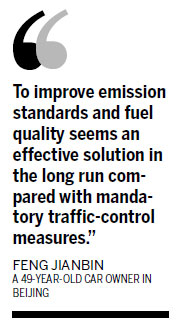Beijing to introduce stricter automobile emission rules
Updated: 2013-01-24 07:20
By Zheng Xin (China Daily)
|
||||||||

The capital will raise its automobile-emission standards on Feb 1, making them the strictest in the nation in a move that the Beijing Environmental Protection Bureau said is expected to reduce auto pollution by 40 percent.
"Beijing is the first city nationwide that has introduced the fifth phase of emission standards for automobiles," bureau spokesman Fang Li said. "The move is an attempt to better improve air quality in the capital."
Fang said Beijing is taking the lead in implementing stricter emission standards for automobiles as a pilot project, adding that the new emission standards will be the strictest nationwide. The city will implement the national standards when they are released.
Li Kunsheng, director of the bureau's department of motor vehicles, said that around 1,300 vehicle models had met the stricter emission standards as of Wednesday, and that can meet the current market demand.
A greater variety of vehicles will hit the market to meet the increasing demand, he said.
Li said that compared with the existing automobile emission standards, the stricter version will reduce emissions of nitrogen monoxide by 40 percent. The concentration of PM2.5, or particulate matter smaller than 2.5 micrometers in diameter, will also decrease.
According to the bureau, automobiles account for around 58 percent of total emissions of nitrogen monoxide in the city, and around 40 percent of the total volatile organic compounds.
In addition, cars also account for 22.2 percent of the city's total PM2.5 emissions, it said.
Li said that considering the amount of automobiles in the city is now more than 5.2 million, and the figure is expected to reach 6 million by 2015, implementation of the stricter emission standards is important.
According to Zhao Jingwei, a Beijing lawyer specializing in environmental protection, raising fuel-quality and emission standards can improve the city's air quality in a more effective way than restricting automobile travel.
"It's a good thing that the government continually raises the quality of fuel and reduces the intensity of lead and sulfur, as well as other chemicals that might pollute the air," he said.
Feng Jianbin, a 49-year-old car owner in the city, echoed Zhao's sentiments.
"The government cannot limit our travel to improve the air, you can't encourage us to purchase a vehicle and later forbid us from using it," he said.
"To improve emission standards and fuel quality seems an effective solution in the long run compared with mandatory traffic-control measures."
In addition, the bureau will also speed up the pace of scrapping old polluting vehicles.
The bureau has come up with an initiative to rid the city of its aging and polluting vehicles by providing benefits to local motorists.
According to Fang, the city got rid of 370,000 aging vehicles in 2012, and aims to get rid of another 180,000 in 2013.
The drive has turned effective in weeding out heavily polluting vehicles, and the bureau said it will continue to introduce more benefits to encourage aging vehicles off the road.
"The implementation of stricter automotive emission standards will improve the city's air quality in the long run," he said.
Li said Beijing is well prepared for the implementation of the new emission standards, as the city has started providing a cleaner supply of gasoline and diesel with a concentration of sulfur no more than 10 ppm since last May.
Li said automobiles meeting the stricter emission standards are all equipped with a fuel particulate filter, which also requires a higher standard of fuel - with a sulfur content of no more than 50 ppm. Otherwise, the filter will be damaged and cause the vehicle to break down.
According to Li, despite the fuel supply with lower concentration of sulfur provided in Beijing, the quality of fuel supplement in neighboring cities still lags far behind the capital.
Some cities around the capital are still providing gasoline with a sulfur content around 150 ppm and diesel with a sulfur content of no more than 2,000 ppm, he said.
"It's necessary that the capital, together with its neighboring cities, jointly deal with pollution," he said.
zhengxin@chinadaily.com.cn
(China Daily 01/24/2013 page5)

 In Photos: 7.0-magnitude quake hits Sichuan
In Photos: 7.0-magnitude quake hits Sichuan
 Li Na on Time cover, makes influential 100 list
Li Na on Time cover, makes influential 100 list
 FBI releases photos of 2 Boston bombings suspects
FBI releases photos of 2 Boston bombings suspects
 World's wackiest hairstyles
World's wackiest hairstyles
 Sandstorms strike Northwest China
Sandstorms strike Northwest China
 Never-seen photos of Madonna on display
Never-seen photos of Madonna on display
 H7N9 outbreak linked to waterfowl migration
H7N9 outbreak linked to waterfowl migration
 Dozens feared dead in Texas plant blast
Dozens feared dead in Texas plant blast
Most Viewed
Editor's Picks

|

|

|

|

|

|
Today's Top News
Live report: 7.0-magnitude quake hits Sichuan, heavy casualties feared
Boston suspect cornered on boat
Cross-talk artist helps to spread the word
'Green' awareness levels drop in Beijing
Palace Museum spruces up
First couple on Time's list of most influential
H7N9 flu transmission studied
Trading channels 'need to broaden'
US Weekly

|

|







